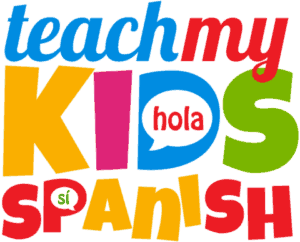
Fun Spanish jokes are a great way to learn a new language. Jokes are fun and having fun is a fantastic way to learn new words and phrases. This is a perfect way to learn Spanish and actually remember it! I did some research on fun Spanish jokes for kids and wrote this helpful blog post.
Let’s dive into the jokes and start the belly laughs!
Fun Spanish Jokes For Kids (a/k/a Bad Dad Jokes!)
The Spanish word for joke is chiste. In Spanish, there is a different word for practical jokes, but we are only going to concentrate on the jokes that you actually tell someone. The chistes that you tell someone can be puns or corny jokes.
My favorite type of jokes tend to classified as Bad Dad Jokes . . . you know, the jokes that are so corny and dorky that people are slightly embarrassed by the joke-teller. I am pretty sure that is where my jokes are starting to go. And I am excited to embarrass my kids as they get older!
Here are some chistes, puns, corny jokes . . . and Bad Dad Jokes!
Joke #1 – Eyes
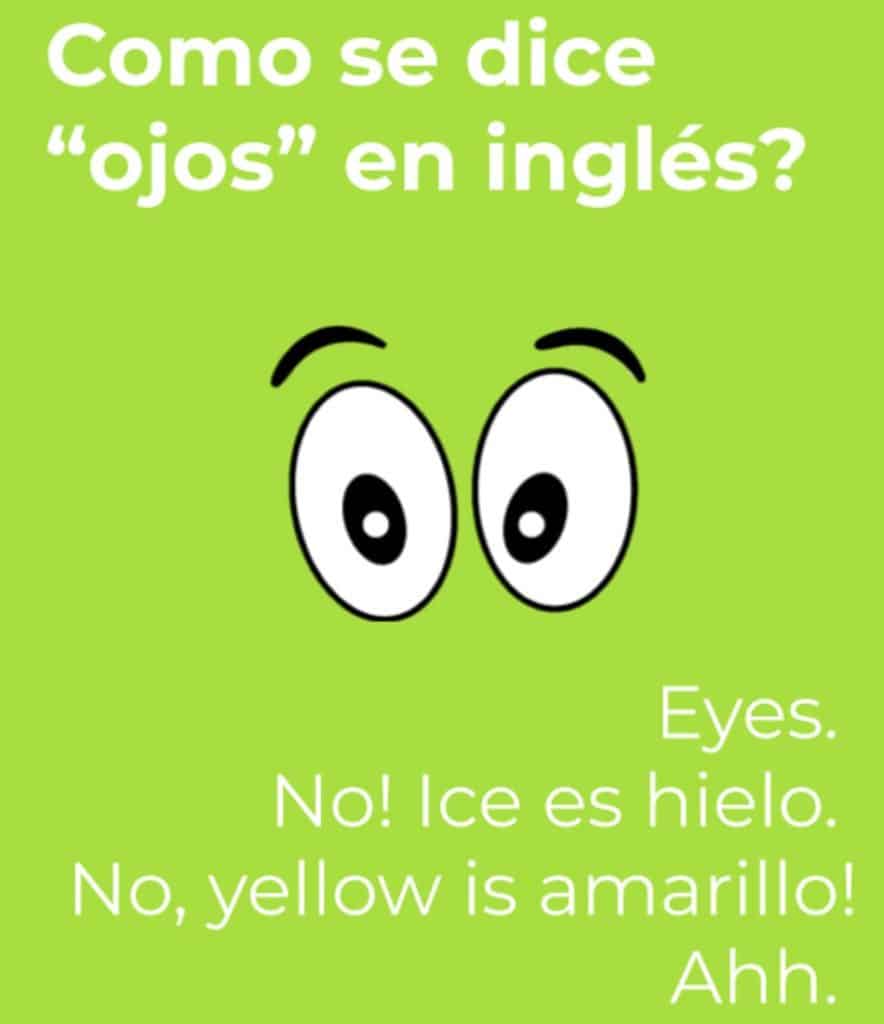
- Como se dice “ojos” en inglés?
- Eyes.
- No! Ice es hielo.
- No, yellow es amarillo!
- Ahhh.
Translation:
- How do you say “eyes” in English?
- Eyes.
- No, ice is ice!
- No, yellow is yellow.
- Ahhhh.
This is the first and only chiste that has a mix of English and Spanish in the joke. It is a play on words and their pronunciation.
The joke asks how to say eyes in English, but eyes also sound like the English word ice. The Spanish word for ice is hielo, but hielo also sounds like yellow. And the Spanish word for yellow is amarillo. One big circle of words that sound similar in English and Spanish!
Joke #2 – The Most Patient Fruit
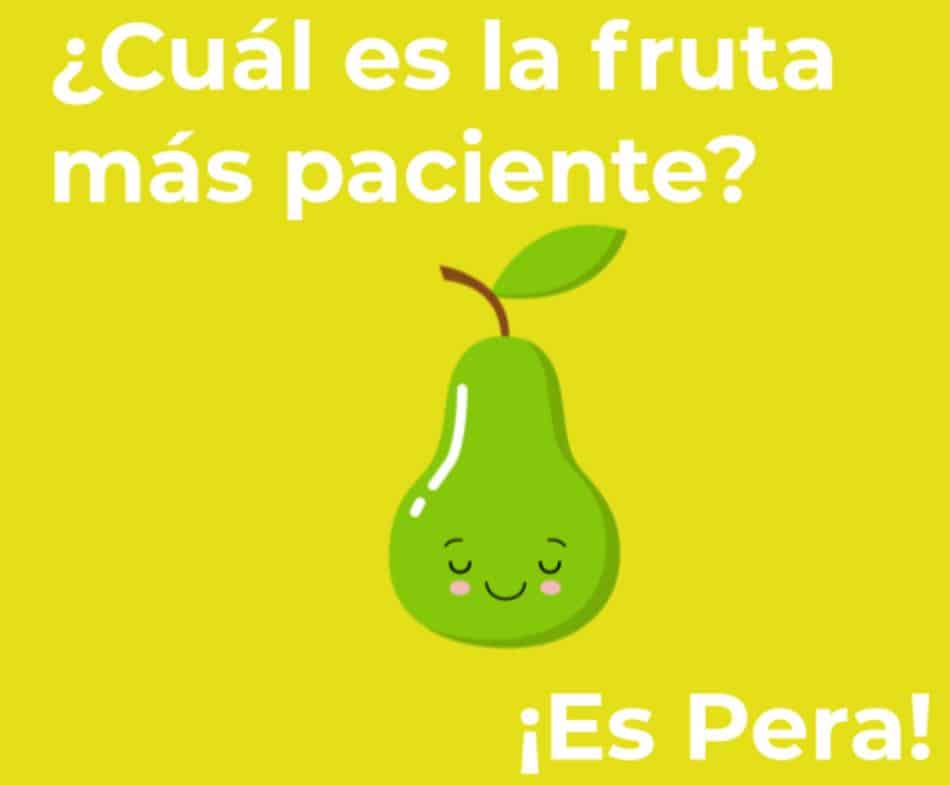
- ¿Cuál es la fruta más paciente?
- Es pera.
Translation:
- What is the most patient fruit?
- It is a pear.
I love this joke! A pear is the most patient fruit! This is another play on words in the Spanish language. The Spanish verb espera means to wait or waiting. So, when we talk about the most patient fruit, then having to wait on something would definitely qualify for the joke!
Joke #3 – Christian Soccer Jokes!
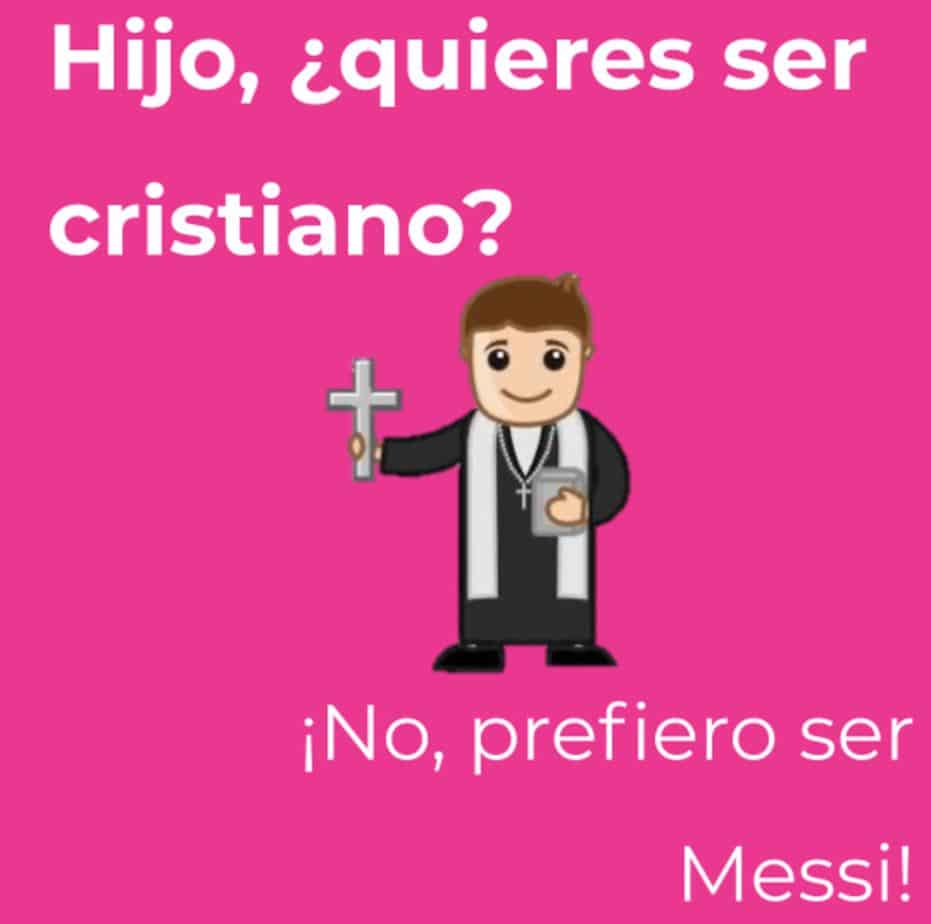
- Hijo, ¿quieres ser cristiano?
- ¡No, prefiero ser Messi!
Translation:
- Son, do you want to be a Christian?
- No, I prefer to be Messi!
Here is a little religious chiste mixed in with soccer. Cristiano Ronaldo and Lionel Messi are superstar soccer players. Here are links to the Wikipedia pages for Cristiano Ronaldo and Lionel Messi. Ronaldo’s first name translates to Christian in English, and there is also debate among soccer enthusiasts regarding whether Cristiano Ronaldo or Lionel Messi is the better player. This joke plays into the soccer superstar debate and is a play on words for Cristiano and Christian.
Joke # 4 – When I was a kid . . .
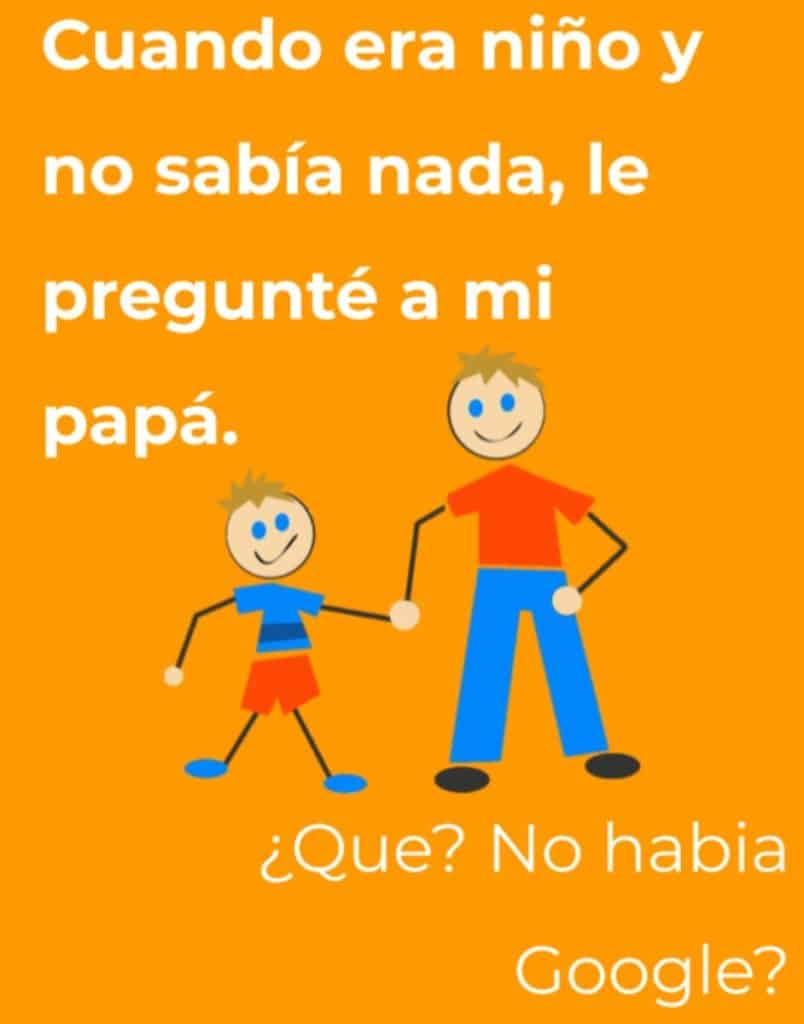
- Cuando era niño y no sabía nada, le pregunté a mi papá.
- ¿Que? No habia Google?
Translation:
- When I was a child and I didn’t know anything, I asked my dad.
- What? There was no Google?
Have you overheard conversations like this between father and son? Where father and son are on different wavelengths? In today’s age, kids grow up with phones attached to their hands and therefore information at the tips of their fingers. But when the father grew up, his main resources were asking other people for help.
Joke #5 – The Most Fun Fruit
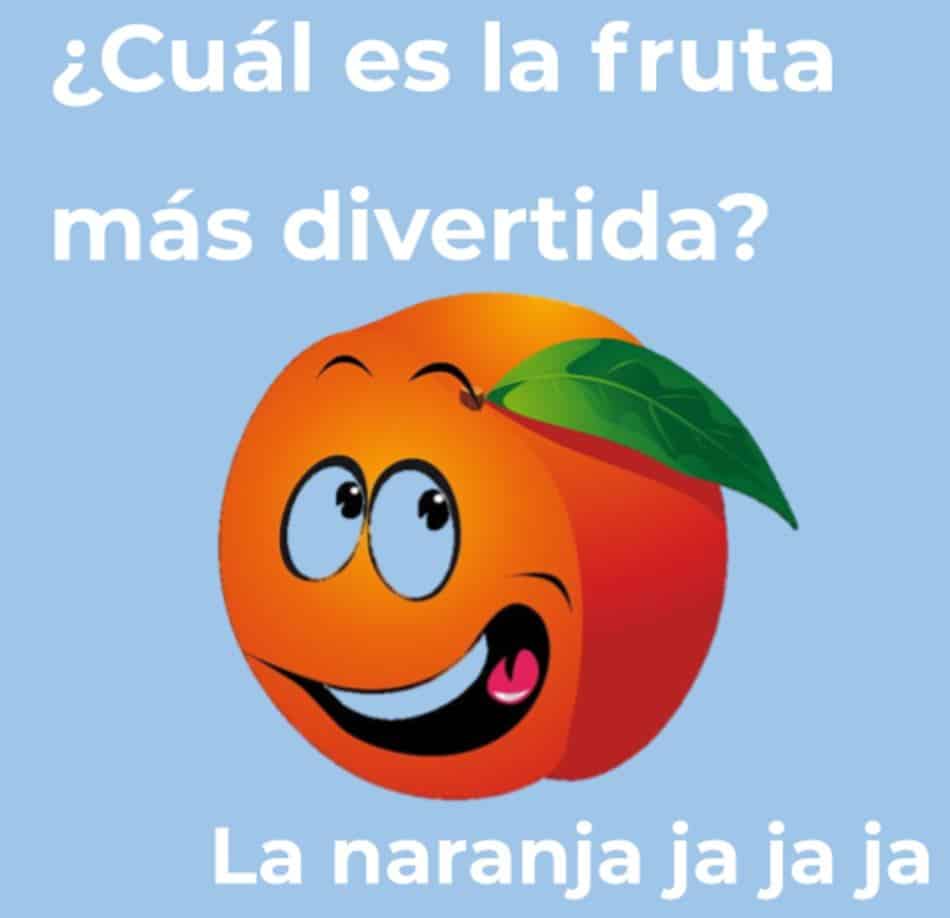
- ¿Cuál es la fruta más divertida?
- La naranja ja ja ja
Translation:
- What is the most fun fruit?
- The orange ha ha ha
The joke asks, what is the most fun fruit?. The answer is the orange ha ha ha, because the way that you spell the laughing phrase of ha ha ha in English is translated to ja ja ja in Spanish. The Spanish word of naranja (orange in English) ends with ja, which means that the orange can laugh it up and have all the fun!
Joke #6 – Fish
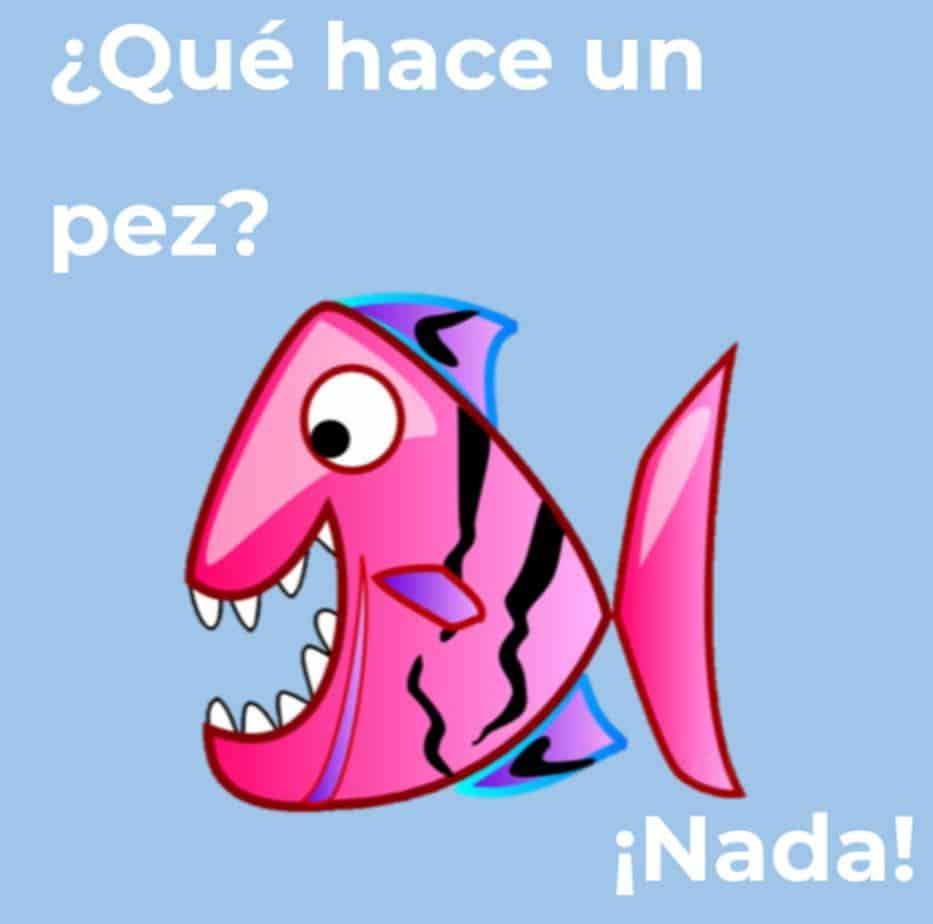
- ¿Qué hace un pez?
- ¡Nada!
Translation:
- What does a fish do?
- Nothing!
The joke centers on the Spanish word nada which means nothing and the Spanish verb nadar which means to swim. Obviously, a fish swims in the water, but with the play on words, the fish does nothing!
Joke #7 – Math Book
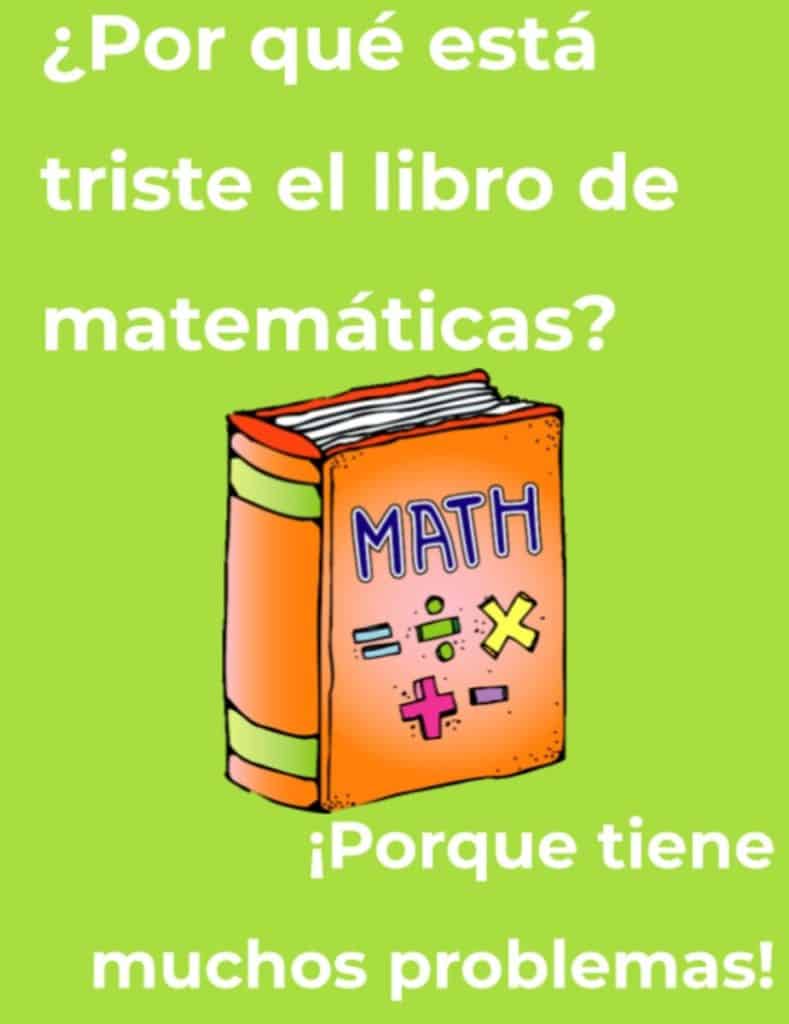
- ¿Por qué está triste el libro de matemáticas?
- ¡Porque tiene muchos problemas!
Translation:
- Why is the math book sad?
- Because he has many problems!
This is just the worst of the worst of Bad Dad Jokes! It’s soooo bad that it makes me die laughing! If you don’t get the joke, the question is Why is the math book sad? Because it has many problems! Do you get it? The book is sad because it has problems! And a math book is filled with problems to solve!
Joke #8 – Old MacDonald
- ¿Qué dijo el Viejo MacDonald cuando tuvo una hija?
- Hi-ja Hi-ja Oh
Translation:
- What did Old MacDonald say when he had a daughter?
- Daughter Daughter Oh
Old MacDonald is the classic children’s nursery rhyme. If you don’t know it, the song goes something like Old MacDonald Had a Farm . . . E-I-E-I-O! Also, I embedded a YouTube video below. Anyways, when you sing E-I-E-I-O during the song, it also sounds like Hi-ja Hi-ja Oh.
Joke #9 – Nose
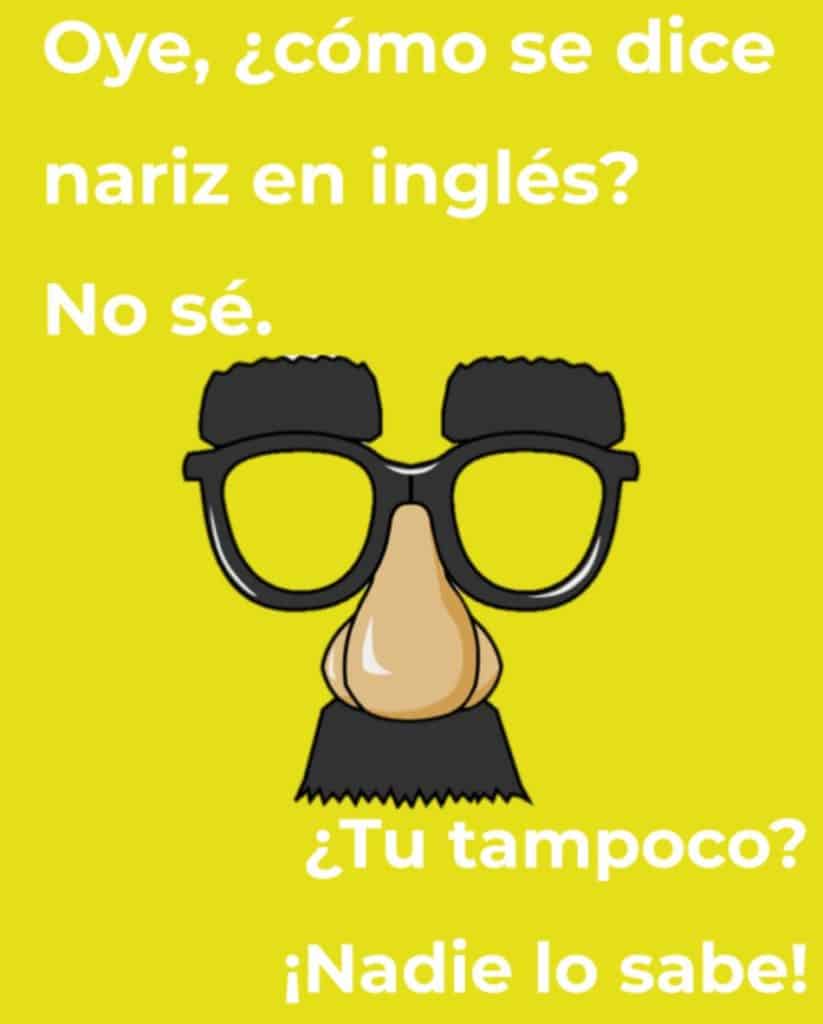
- Oye, ¿cómo se dice nariz en inglés?
- No sé.
- ¿Tu tampoco?
- ¡Nadie lo sabe!
Translation:
- Hey, how do you say nose in English?
- I don’t know.
- You neither?
- Nobody knows!
Here is another play on words in the Spanish language. The Spanish word of nariz translates to nose in English. However, the little joke is that No sé in Spanish translates to I don’t know in English. At the same time, No sé is also the exact same spelling for nose in English! Do you get it!??
Joke #10 – Ghosts
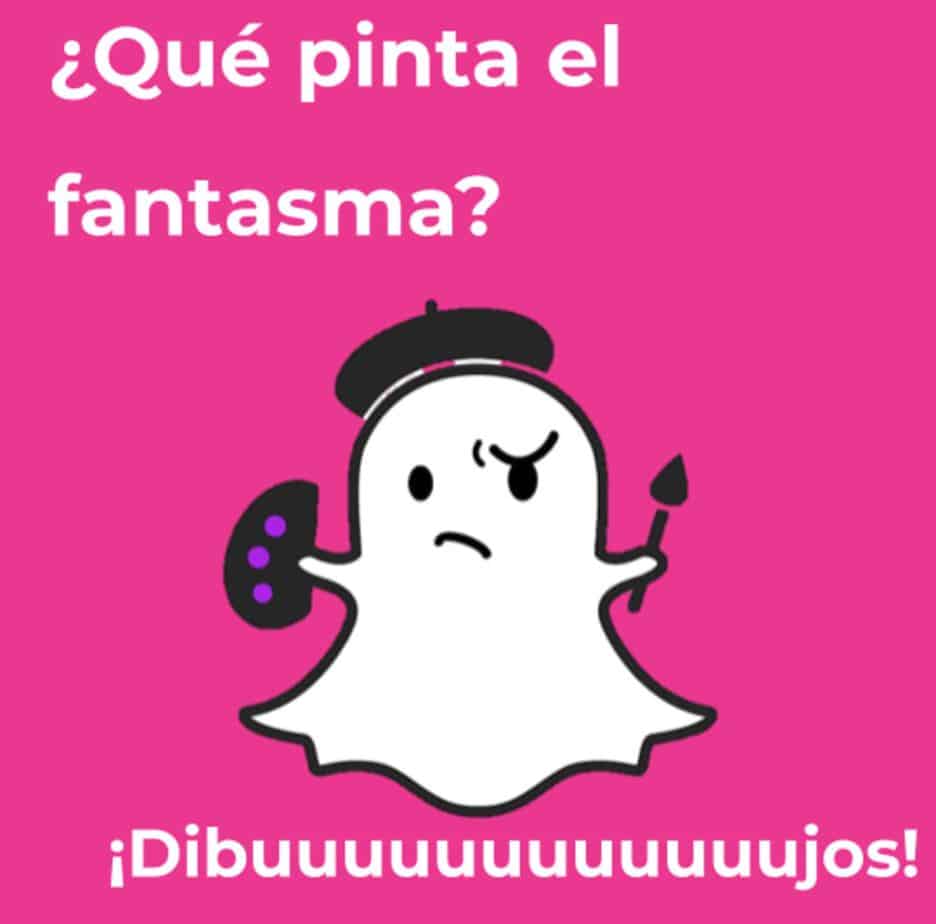
- ¿Qué pinta el fantasma?
- ¡Dibuuuuuuuuuuuujos!
Translation:
- What does the ghost paint?
- Drawwwwwwwings.
Naturally, a ghost would only paint Dibuuuuuuuuujos! And a ghost only says Boooooooo! The buuuuuuuu in dibujos also sounds like Booooooo, so there is a little tongue-in-cheek joke about our friendly ghosts.
Joke #11 – Good Hearts
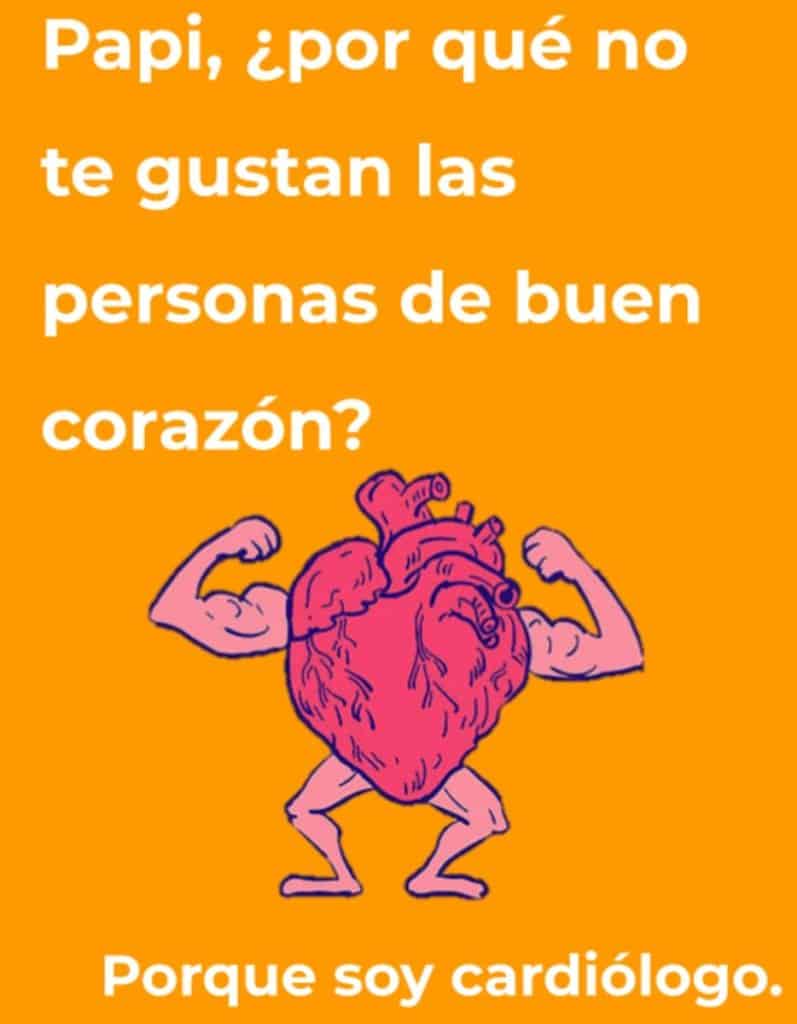
- Papi, ¿por qué no te gustan las personas de buen corazón?
- Porque soy cardiólogo.
Translation:
- Daddy, why don’t you like good-hearted people?
- Because I am a cardiologist.
This joke is definitely for any doctors or nurses in your family! In this joke, a little girl asks her father why he does not like good-hearted people. His response is that he is a cardiologist. Cardiologists make their living by treating and operating on people that do not have good hearts. So, the people that have good hearts hurt the father’s business!
Joke #12 – Your Son’s Name
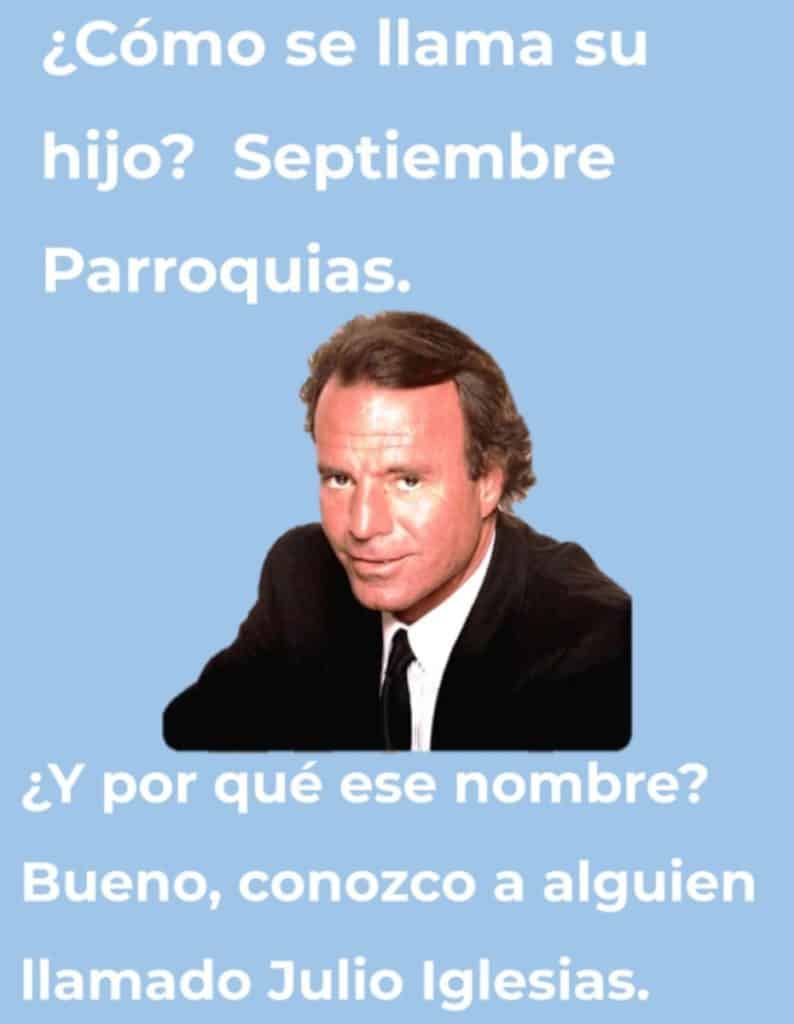
- ¿Cómo se llama su hijo?
- Septiembre Parroquias.
- ¿Y por qué ese nombre?
- Bueno, conozco a alguien llamado Julio Iglesias.
Translation:
- What is your child’s name?
- September Parishes.
- And why that name?
- Well, I know someone named Julio Iglesias.
We have a culture lesson for you on this one. Julio Iglesias is a famous Spanish singer-songwriter. Here is a link to the Wikipedia page for Julio Iglesias. The fun part is that Julio Iglesias literally translates to July Churches in English. So, the joke insinuates that they would have called their baby Julio Iglesias, but they already know someone with that name. Instead, they chose Septiembre Parroquias, which translates to September Parishes.
Joke #13 – Fresh Fruit
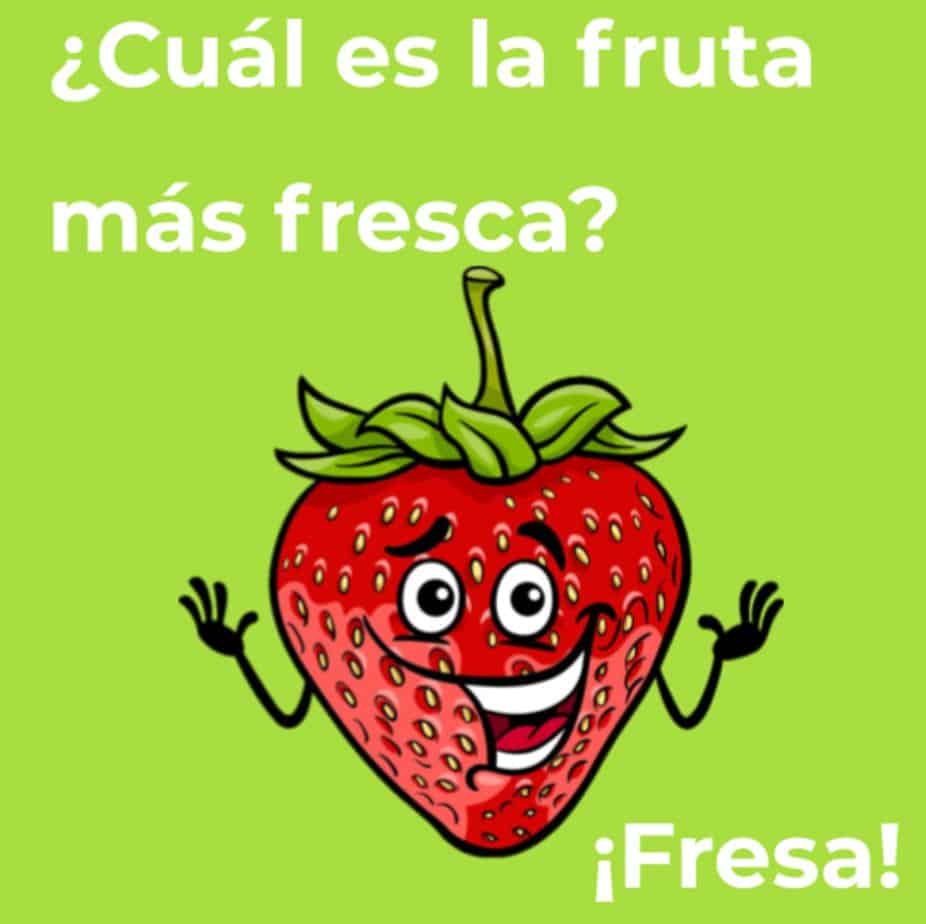
- ¿Cuál es la fruta más fresca?
- Fresa!
Translation:
- What is the freshest fruit?
- Strawberry!
My wife came up with this joke and she is very proud of it. Is there such a thing as Bad Mom Jokes? Anyways, the joke is that the freshest fruit is a strawberry. Strawberry translates to fresa in Spanish, and fresa sounds like the English word fresh. Obviously, in Bad Mom Joke humor, this means that a strawberry has to be the freshest fruit!
Joke #14 – Morning
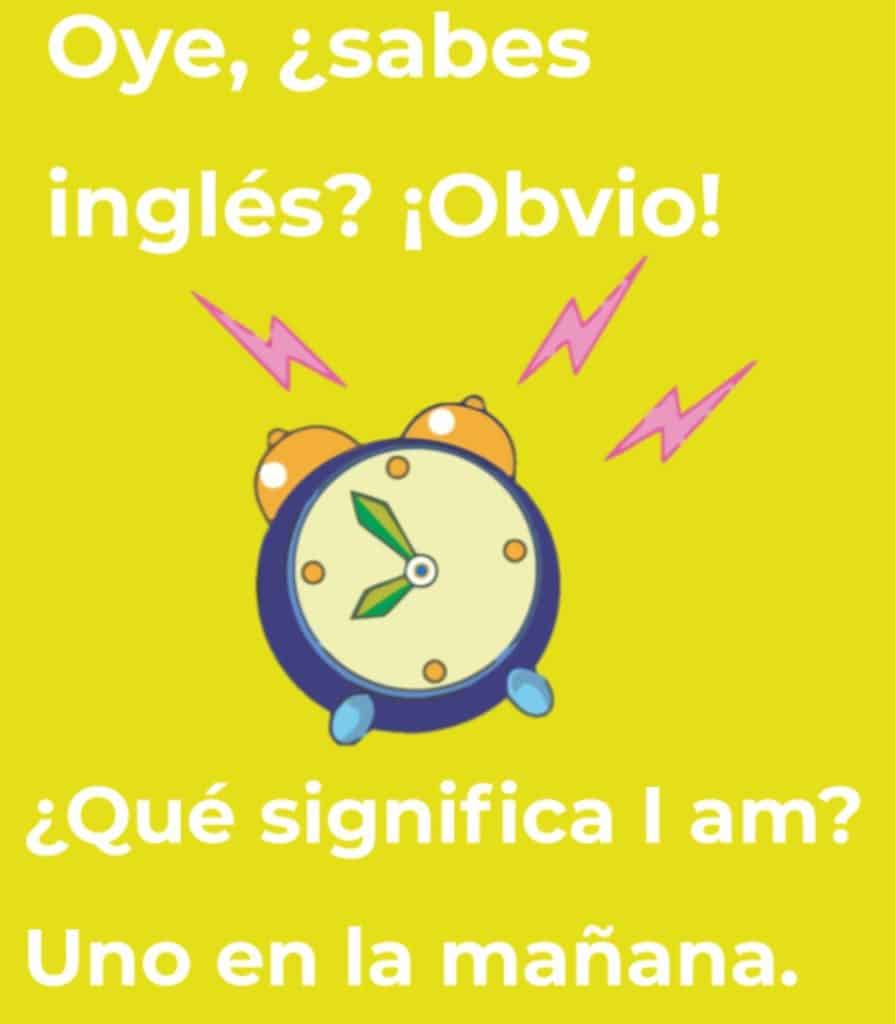
- Oye, sabes inglés?
- ¡Obvio!
- ¿Qué significa I am?
- Uno en la mañana.
Translation:
- Hey, do you know English?
- Obvious!
- What does I am mean?
- One in the morning.
Ha ha ha! Okay, this is terribly corny joke. Instead of the phrase being I am, the person thinks that they are asking about 1 a.m., which is actually one in the morning. It’s correct and not correct at the same time. Also, confusing and not confusing at the same time. Does that make sense? Whatever . . . On to the next chiste!
Joke #15 – Bee at the Gym
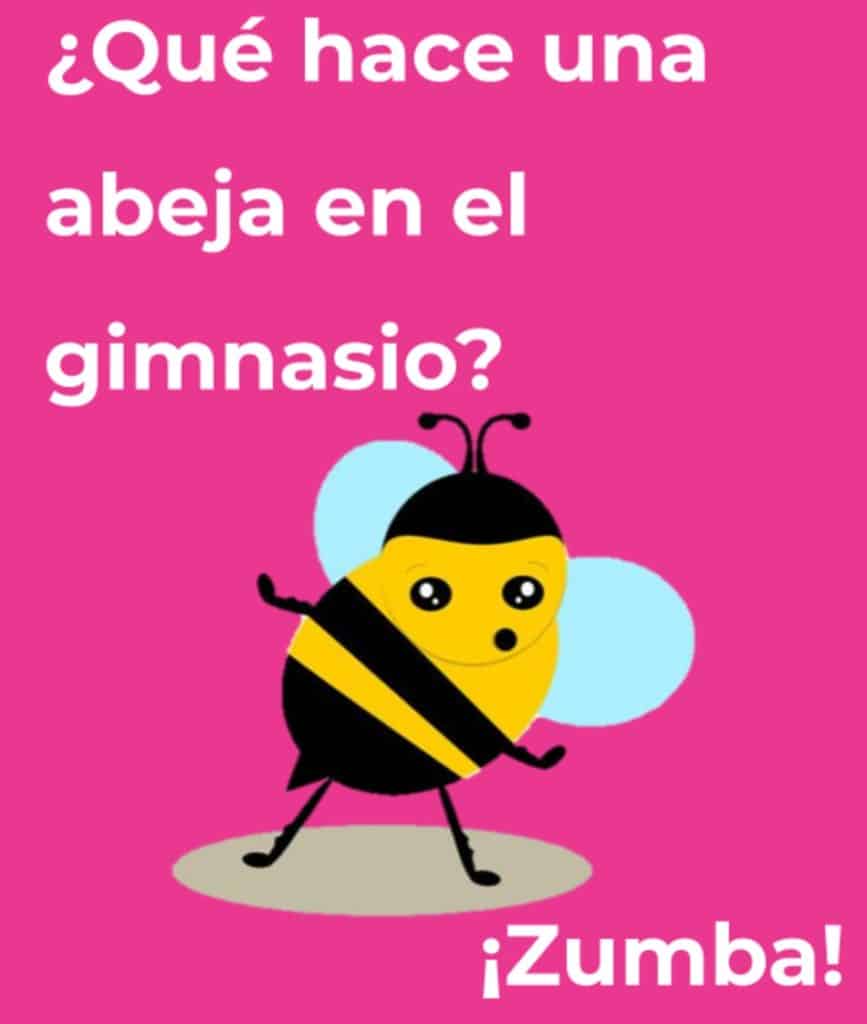
- ¿Qué hace una abeja en el gimnasio?
- Zumba!
Translation:
- What does a bee do in the gym?
- Zumba!
This is a play on the Spanish verb zumbar which means to buzz. Buzzing is the sound and action that bees do, so naturally a bee would take a Zumba class at the gym!
Joke #16 – Lazy Cows
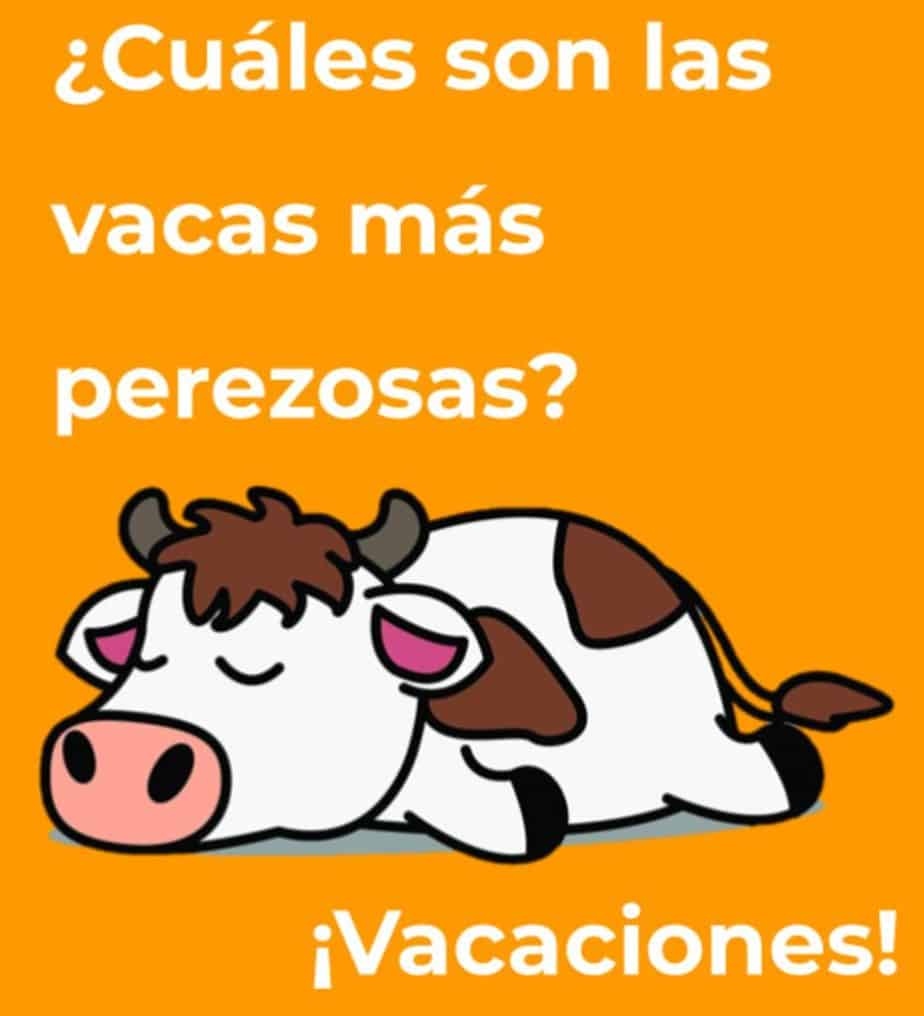
- ¿Cuáles son las vacas más perezosas?
- ¡Vacaciones!
Translation:
- What are the laziest cows?
- Holidays!
This is another tongue-in-cheek joke. The Spanish word for cow is vaca. The Spanish word for holidays is vacaciones. If you separate the beginning of vacaciones, you will find vaca which means cow. If you put two and two together, then you find that the Spanish word for cow is a part of the Spanish word for holidays.
Joke #17 – Mars
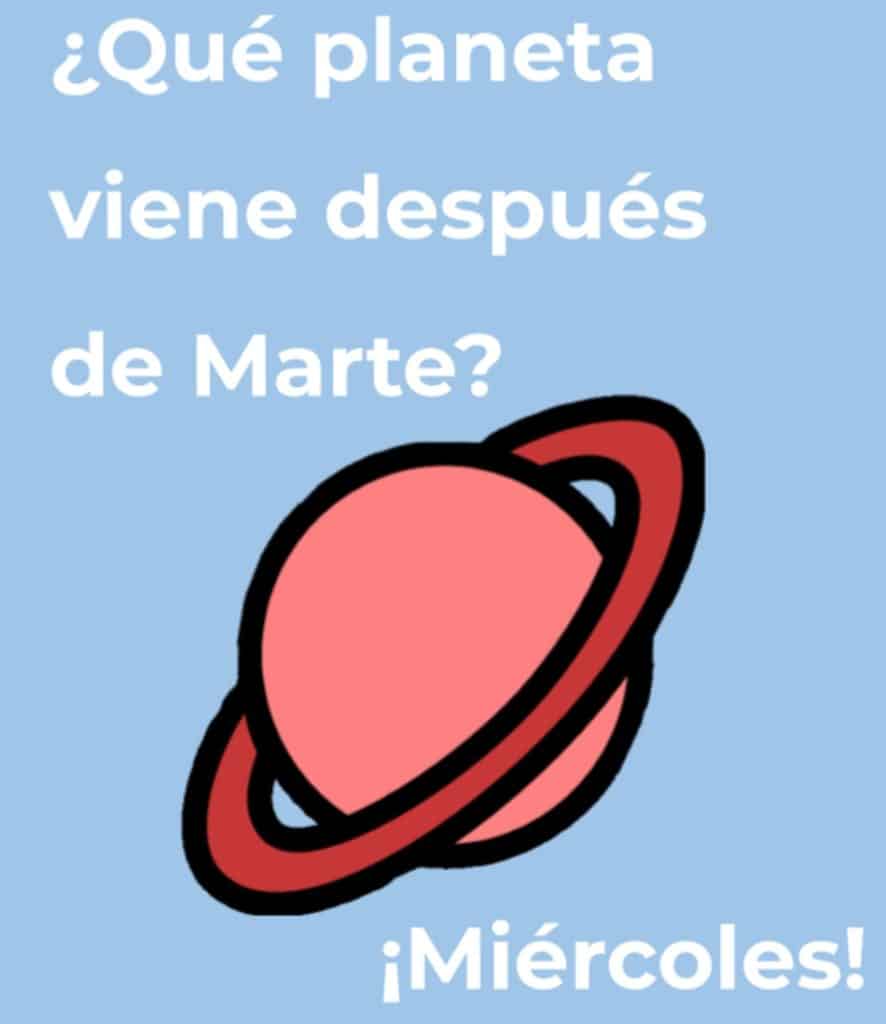
- ¿Qué planeta viene después de Marte?
- ¡Miércoles!
Translation:
- What planet comes after Mars?
- Wednesday!
Do you remember the words for the Spanish days of the week? Lunes, Martes, Miércoles, Jueves, Viernes, Sábado and Domingo.
And we just told you that the Spanish word for the planet Mars translates to Marte. The translations for Mars and Tuesday and very similar in the Spanish language. The only thing differentiating the two is an S at the end of Martes. Therefore, it makes sense that someone would get Marte and Martes confused in Spanish, which naturally leads to someone answering Miércoles because it is the day after Tuesday.
Joke #18 – Salsa Time
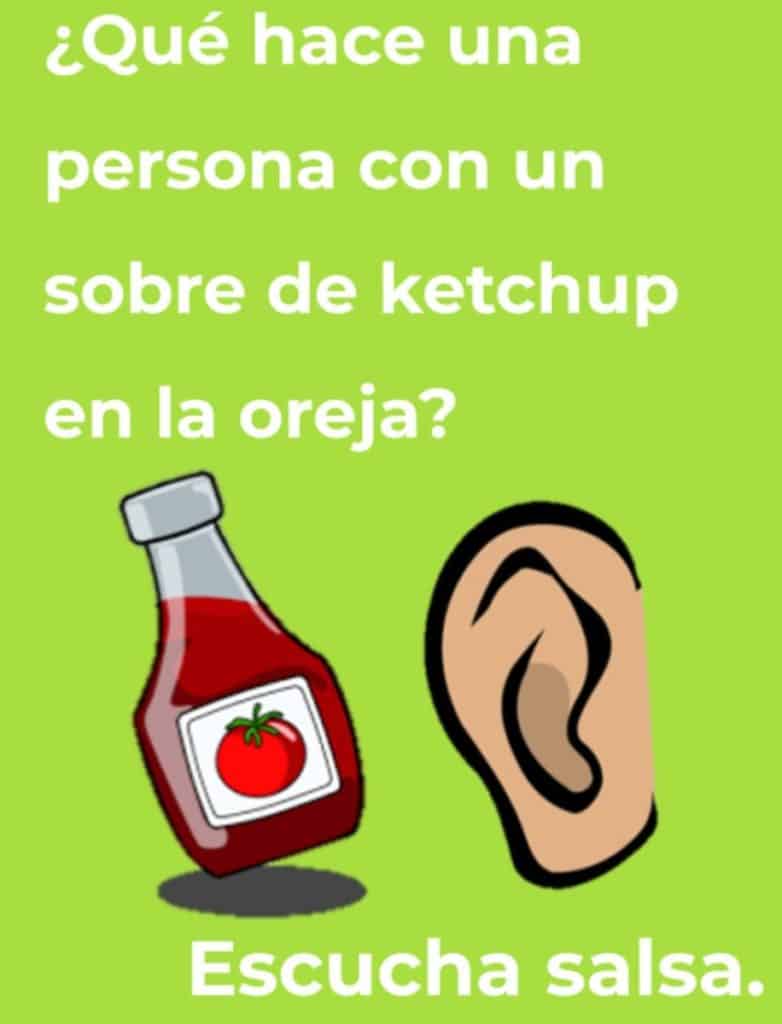
- ¿Qué hace una persona con un sobre de ketchup en la oreja?
- Escucha salsa.
Translation:
- What is a person with a ketchup packet in their ear doing?
- Listening to salsa.
Salsa refers to a type of sauce or a musical genre. Here the ketchup in the ear is a pun about the musical genre. Obviously, you can’t listen to music very well with a packet of ketchup in your ear! However, it is another fun play on words. Ketchup and salsa are similar, so having salsa in your ear means that you could be listening to it . . . right? Or is this another Bad Dad Joke?
Joke #19 – Astronomy Humor
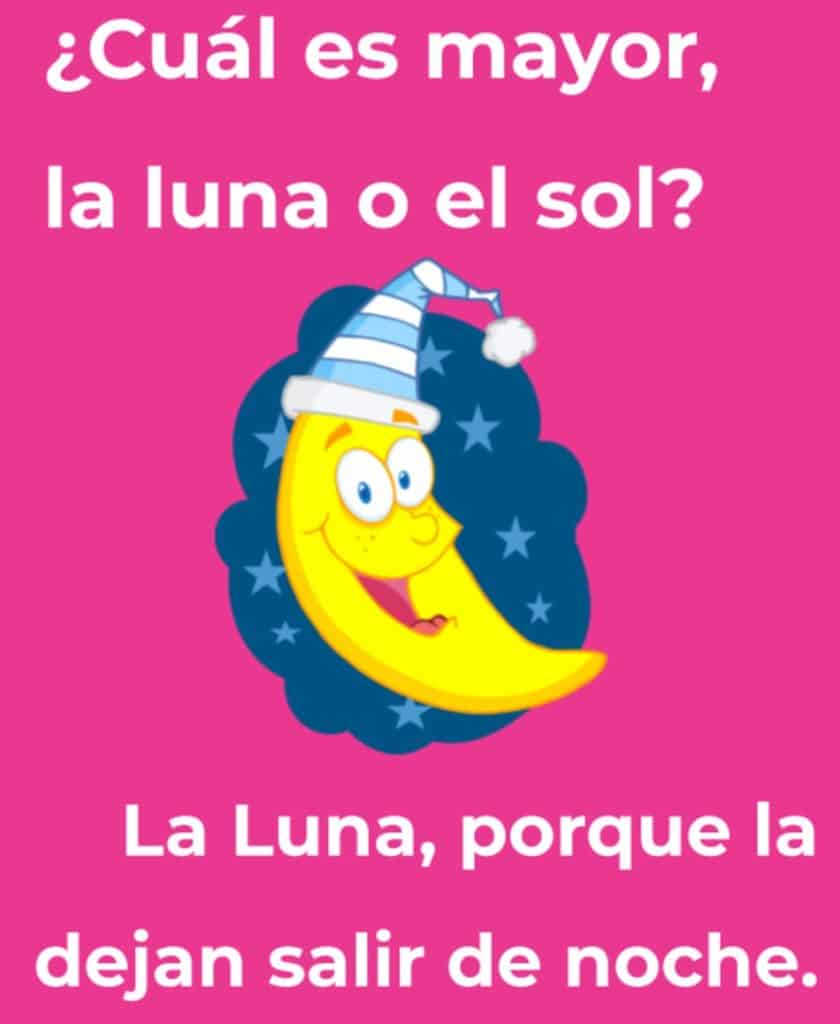
- ¿Cuál es mayor, la luna o el sol?
- La Luna, porque la dejan salir de noche.
Translation:
- Which is older, the moon or the sun?
- The moon, because they let her go out at night.
This joke works because most people believe that they are being asked a serious question about astronomy. However, the joke gets turned upside down for a situation that would most likely involve two kids. The best part is that the moon is, in fact, the only one that comes out at night!
Joke #20 – Apple at the Bus Stop
- Hay una manzana esperando al autobús en la parada.
- Viene un platáno y le preguta a la manzana -¿Hace mucho tiempo que usted espera?
- Dice la manzana -No, siempre he sido una manzana.
Translation:
- There is an apple waiting for the bus at the stop.
- A banana comes and asks the apple – How long have you been waiting?
- The apple says -No, I’ve always been an apple.
This is another joke based around the Spanish verb of espera which translates to waiting or to wait in Spanish. However, the Spanish word of pera translates to pear in English.
Back to the joke . . . the banana asks how long the apple has been waiting there. But the apple thinks that the banana is asking how long the apple has been a pear. The apple, believing that the banana mistakenly identified it as a pear, corrects the banana by letting it know that it is actually an apple.
Joke #21 – Marching Ants
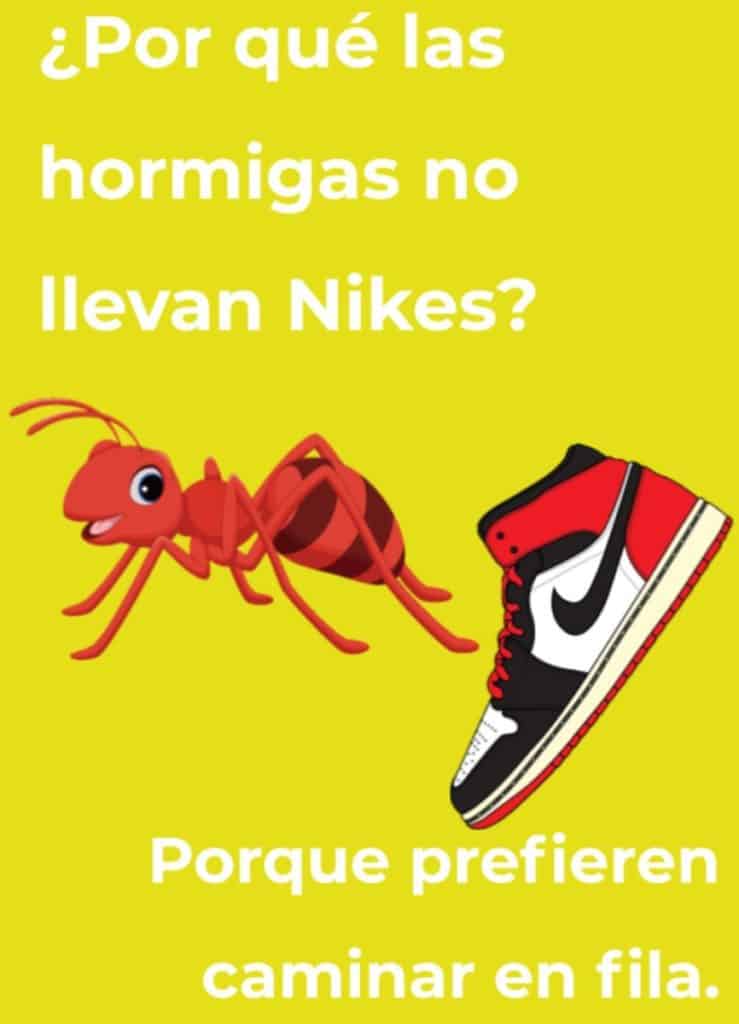
- ¿Por qué las hormigas no llevan Nikes?
- Porque prefieren caminar en fila.
Translation:
- Why don’t ants carry Nikes?
- Because they prefer to walk in line.
This is a pun on the shoes made by Nike and Fila. Also, the Spanish phrase en fila translates to in line in English, so it is a play on words, too. Ants don’t carry Nike shoes because they prefer Fila shoes! That is the joke!
Related Posts
If you liked this blog post, below are some other blog posts that may interest you:
